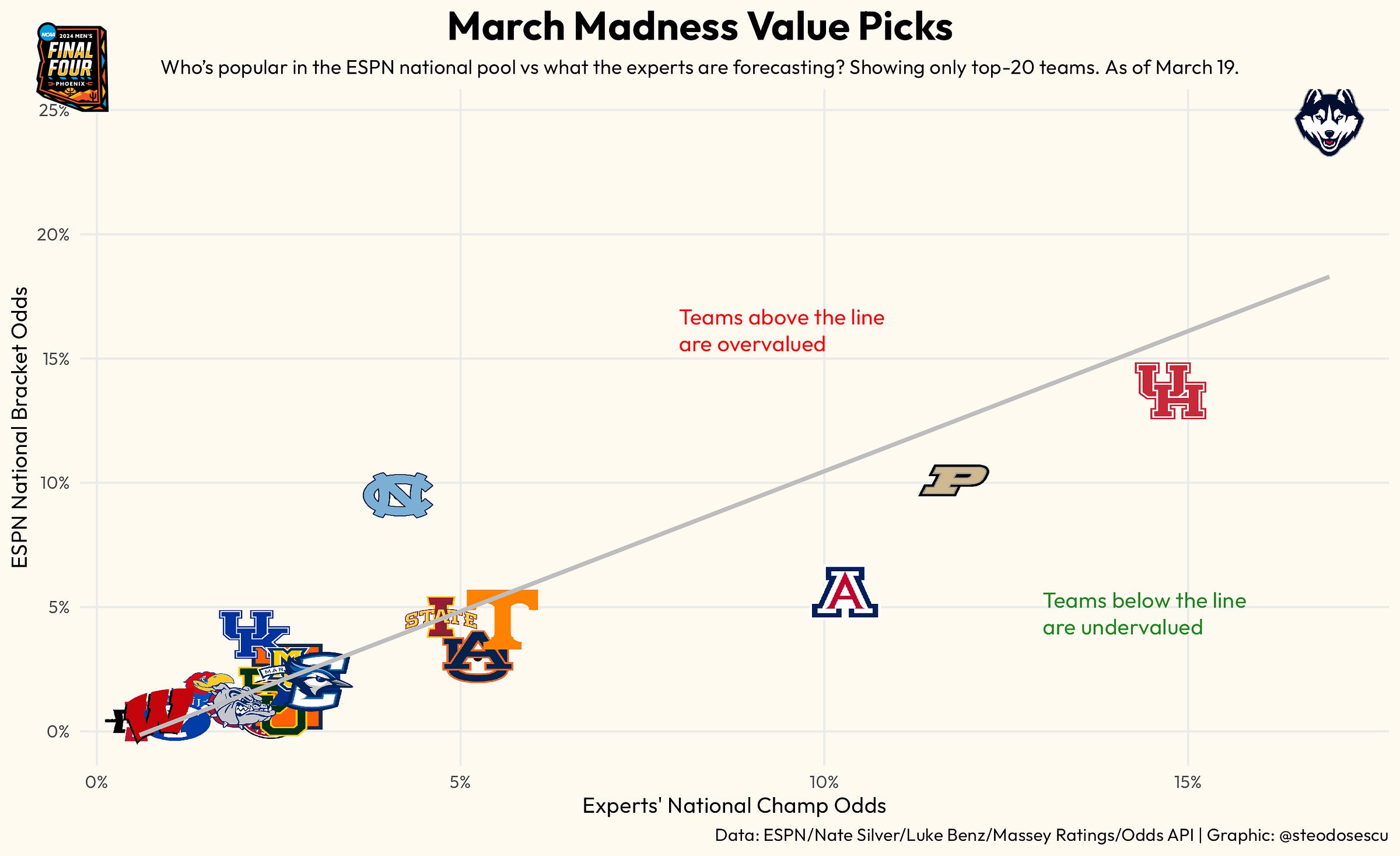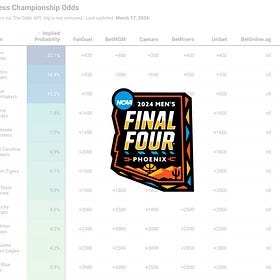Think like Warren Buffett: picking value in your March Madness bracket
The first round of the 2024 NCAA tourney starts Thursday, and we strategize on picking the winner using a data-driven approach.
A version of this article ran in 2017, 2018, 2022 and 2023.
It’s that time of year again. Where everyone, this author included, becomes expert bracketologists despite having watched precisely zero NCAA basketball games throughout the regular season.
Winning your office March Madness pool is as much about predicting basketball scores as it is predicting the behavior of your coworkers. I have a simple philosophy when it comes to trying to win my pool to this end, and I encourage you to buy into it too:
Look for value against the public in picking early round games, but don’t get too crazy with upset-minded picks.
Keep your Final Four intact (by eschewing tempting Cinderella stories and picking higher seeds).
Make a “contrarian” pick to win it all.
The Wall Street Journal’s Andrew Beaton and Ben Cohen write a version of that recommended approach every year. Their latest advice: “You want to act like a value investor, channel your inner contrarian and pick the most likely, least popular national champion.”
A lot of the decision of who to pick to win it all is driven by the size of your tournament pool. You may pick a different champion in a 1000-plus person contest vs your smaller 30-person pool at the office. The goal is to have a unique enough bracket that gives you the best chance to be the sole winner when the confetti flies at the end of the tourney.
The teams that best meet that criteria this year in the men’s tournament: Houston, Purdue and Arizona.
UCONN, the consensus No. 1 team, is nearly off the charts because the experts and public both think they have the best chance to win it all this year. It’s no wonder because not only is it the defending national champion, Connecticut has been the best team all year, according to various rating systems. But despite the Huskies’ lofty expectations it’s still more likely than not they won’t be standing on the winner’s podium in Phoenix. The public’s confidence in the Huskies make this team vastly overvalued — meaning several other teams are being undervalued.
Houston is one of those teams. The Cougars are being picked in 13.7 percent of brackets in ESPN’s Tournament Challenge, second highest of any team behind UCONN; but an ensemble of experts give them a 14.8 percent chance to win the national championship when averaging various models1.
Last year, Purdue was a No. 1 seed — as they are again this year — but infamously lost to No. 16 seed Fairleigh Dickinson in the first round, making the Boilermakers only the second one-seed to lose to a 16 in NCAA Tournament history. But that means there is value in picking Purdue this year as most people will remember the foul taste the Boilermakers left in their mouth last year and are subsequently avoiding them.
Auburn, Iowa State and Tennessee make good value picks as well, especially in bigger brackets where you’ll have to search for deeper value; those teams are all top-10 in Ken Pomeroy’s Adjusted Efficiency Margin (AdjEM) but are being picked in only three to five percent of all brackets on ESPN’s site as of Wednesday night.
Auburn is an interesting case because they were granted a No. 4 seed by the selection committee despite being the nation’s fourth best team overall, according to KenPom. That relatively high seed seems to be scaring bracket-makers as the Tigers are being picked in only three percent of all brackets despite experts giving them a 5.2 percent chance on average.
Looking further down the list, teams like Creighton, Iowa State, Alabama and Baylor represent plucky picks too.
Between the Pipes’s pick: Arizona.
North Carolina is always a popular pick because of the recognizable name and its powder blue uniforms, but too many people are selecting the Tar Heels in ESPN’s national bracket. The Heels are the weakest No. 1 seed, according to Pomeroy, and I like that Arizona has them in their region. Couple that with the fact only 4.6 percent of brackets are selecting the Wildcats to win the tournament vs. experts’ average of 11.6 percent, and this team feels like Warren Buffet’s nirvana2.
UCONN has the most efficient offense in the country and Houston has the best defense, but Arizona ranks as the No .2 team overall when looking at Basketball Reference’s Simple Rating System (SRS), a holistic metric that takes into account point differential and strength of schedule. That, plus, if the ‘Cats make it to the Final Four they will have de facto home court advantage since it will be held in Phoenix, Ariz. this year.
If you’re interested in the chances various Vegas bookmakers are giving each team check out my post from earlier this week. I used these lines as an input in computing the composite average of expert prognosticators in the above rankings:
2024 March Madness Championship Probabilities
The following shows the latest betting odds and implied win probabilities for teams to win the 2024 NCAA men’s national championship, derived from a composite average of global bookmakers’ lines. All odds accessed via The Odds API. Use the Odds Converter Tool
March Madness Squares
For some bonus content, I was introduced to a new game known as March Madness squares this year. It’s a variation on Super Bowl squares — the core concept is the same, where you have a 10x10 grid of squares set up and each row and column are randomly assigned a number from 0 to 9. Just like a Super Bowl Squares pool, each square of the grid can be claimed by a pool member. The way to win is by having the intersecting square that matches the final digit of each team’s score at the end of the game. The difference here is rather than playing one game like the Super Bowl, your square is in play for all 63 tourney games.
Knowing this I ran the numbers, similar to what I do every year for the Super Bowl, to see if certain squares have an advantage. Unlike football, where scoring happens in bunches of threes, sixes and sevens most often, all digits seem to be pretty even in college basketball.
If you get a chance to join a squares pool like this I highly recommend it.
Whether you’re playing the traditional bracket pool or squares, good luck this year!
An ensemble average of Nate Silver, Luke Benz, Massey ratings and implied championship probabilities from a variety of bookmakers.
Never mind he’s from Omaha, home of the Creighton Bluejays.








